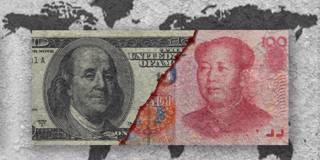Whether or not US President Donald Trump and his Chinese counterpart, Xi Jinping, agree to another truce at the upcoming G20 summit in Osaka, the Sino-American conflict has already entered a dangerous new phase. Though a negotiated settlement or a managed continuation of the status quo are possible, a sharp escalation is now the most likely scenario.
NEW YORK – The nascent Sino-American cold war is the key source of uncertainty in today’s global economy. How the conflict plays out will affect consumer and asset markets of all kinds, as well as the trajectory of inflation, monetary policy, and fiscal conditions around the world. Escalation of the tensions between the world’s two largest economies could well produce a global recession and subsequent financial crisis by 2020, even if the US Federal Reserve and other major central banks pursue aggressive monetary easing.
Much, therefore, depends on whether the dispute does indeed evolve into a persistent state of economic and political conflict. In the short term, a planned meeting between US President Donald Trump and his Chinese counterpart, Xi Jinping, at the G20 Summit in Osaka on June 28-29 is a key event to watch. A truce could leave tariffs frozen at the current level, while sparing the Chinese technology giant Huawei from the crippling sanctions that Trump has put forward; failure to reach an agreement could set off a progressive escalation, ultimately leading to the balkanization of the entire global economy.
Jaw-Jaw or War-War?
Viewed broadly, there are three scenarios for how the situation might develop between now and the end of 2020, when the United States will hold its next presidential election. One possibility is that Trump and Xi will find a truce or modus vivendi in Osaka, paving the way for a negotiated settlement toward the end of this year. On the trade front, the US wants China to buy more American goods, reduce tariff and non-tariff barriers, open more financial and service sectors to foreign direct investment, and commit to maintaining currency stability and transparency with respect to foreign-exchange data.

NEW YORK – The nascent Sino-American cold war is the key source of uncertainty in today’s global economy. How the conflict plays out will affect consumer and asset markets of all kinds, as well as the trajectory of inflation, monetary policy, and fiscal conditions around the world. Escalation of the tensions between the world’s two largest economies could well produce a global recession and subsequent financial crisis by 2020, even if the US Federal Reserve and other major central banks pursue aggressive monetary easing.
Much, therefore, depends on whether the dispute does indeed evolve into a persistent state of economic and political conflict. In the short term, a planned meeting between US President Donald Trump and his Chinese counterpart, Xi Jinping, at the G20 Summit in Osaka on June 28-29 is a key event to watch. A truce could leave tariffs frozen at the current level, while sparing the Chinese technology giant Huawei from the crippling sanctions that Trump has put forward; failure to reach an agreement could set off a progressive escalation, ultimately leading to the balkanization of the entire global economy.
Jaw-Jaw or War-War?
Viewed broadly, there are three scenarios for how the situation might develop between now and the end of 2020, when the United States will hold its next presidential election. One possibility is that Trump and Xi will find a truce or modus vivendi in Osaka, paving the way for a negotiated settlement toward the end of this year. On the trade front, the US wants China to buy more American goods, reduce tariff and non-tariff barriers, open more financial and service sectors to foreign direct investment, and commit to maintaining currency stability and transparency with respect to foreign-exchange data.